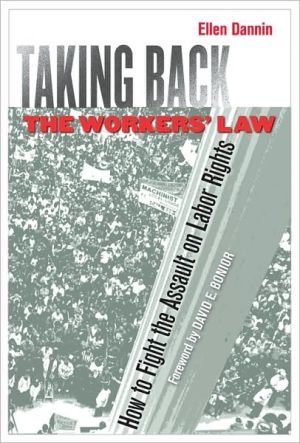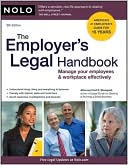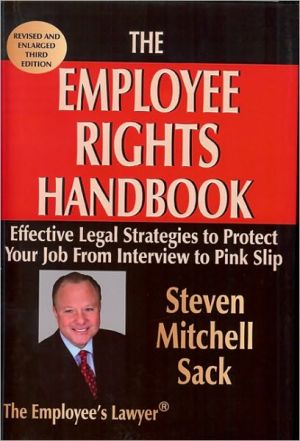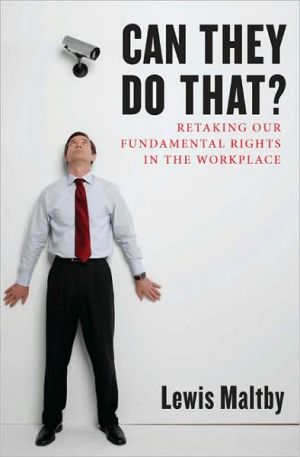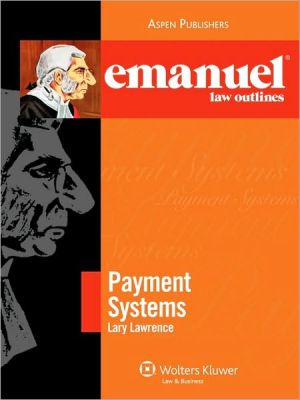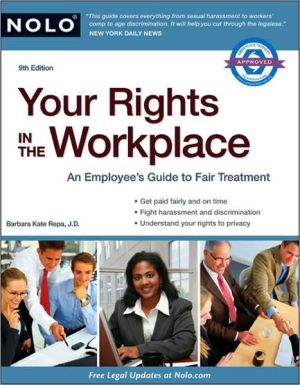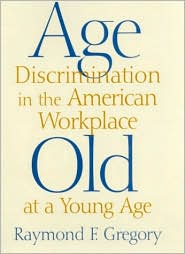Taking Back the Workers' Law: How to Fight the Assaut on Labor Rights
Prolabor critics often question the effectiveness of the National Labor Relations Board. Some go so far as to call the Board labor's enemy number one. In a daring book that is sure to be controversial, Ellen Dannin argues that the blame actually lies with judicial decisions that have radically "rewritten" the National Labor Relations Act. But rather than simply bemoan this problem, Dannin offers concrete solutions for change.Dannin calls for labor to borrow from the strategy mapped out by the...
Search in google:
Prolabor critics often question the effectiveness of the National Labor Relations Board. Some go so far as to call the Board labor's enemy number one. In a daring book that is sure to be controversial, Ellen Dannin argues that the blame actually lies with judicial decisions that have radically "rewritten" the National Labor Relations Act. But rather than simply bemoan this problem, Dannin offers concrete solutions for change.Dannin calls for labor to borrow from the strategy mapped out by the NAACP Legal Defense Fund in the early 1930s to eradicate legalized racial discrimination. This book lays out a long-term litigation strategy designed to overturn the cases that have undermined the NLRA and frustrated its policies. As with the NAACP, this strategy must take place in a context of activism to promote the NLRA policies of social and industrial democracy, solidarity, justice, and worker empowerment. Dannin contends that only by promoting these core purposes of the NLRA can unions survive—and even thrive.
\ From the Publisher"The central theme of this thought-provoking book is taking back the NLRA-the workers' law in the book's title-to restore its original purpose and promise of promoting freedom of association, worker solidarity, and collective bargaining. It should be emphasized that while this is a book about law, it is not a law book. It is written more for union activists (and their attorneys) than legal scholars. And Dannin is very successful in this regard as her engaging style makes this a very accessible call to action for non-lawyers. There is also an important message for social scientists. Part of the litigation strategy for taking back the workers' law is getting judges to see how violations undermine the NLRA's policy goals. This requires social science research to document what happens when the NLRA is violated. There are many books on the decline and potential rejuvenation of the American labor movement. Ellen Dannin's Taking Back the Workers' Law is a unique contribution that will be valuable to both activists and scholars."-John W. Budd, Working USA, Dec. 2006\ "Explores the recent trends that have caused America to move away from the formation of unions, including employer resistance and a shift from the manufacturing sector to the largely nonunion service sector, and describes how to reestablish the significance of workers' rights in American democracy. Discusses why judges rewrite labor law; developing a strategy to take back the National Labor Relations Act (NLRA); NLRA values, American values; the challenges in litigating the NLRA values; litigation themes; NLRA rights within other laws; trying cases-the rules; and using the National Labor Relations Board as a resource."-Journal of Economic Literature\ "I thoroughly enjoyed this book, and I hope its message reaches those more possessed than I of legal acumen and energy."-William Vaughn, Workplace, September 2008\ "This is a book that puts forth an important perspective on how to breathe new life into our labor law. Ellen Dannin advances a wealth of fresh ideas to educate, convince and revitalize a law that has lost much of the legitimacy and respect it once enjoyed. In original and provocative ways, Dannin maintains that too many have lost sight of what our labor law could be and argues forcefully that it can be restored to realize its fundamental purpose. The book is written with passion and conviction, is a pleasure to read, and doesn't require in-depth expertise to follow. It weaves great knowledge and insight that anyone can appreciate into a story about reclaiming a law."-Fred Feinstein, University of Maryland School of Public Policy, Former General Counsel, NLRB\ "Ellen Dannin's Taking Back the Workers' Law is a rich store of information and analysis for students, teachers, practitioners, policymakers, judges, journalists, and all those who care about labor law and workers' rights. Dannin explains U.S. labor law in its real-life application and its failure to live up to the Wagner Act's promise of workers' organizing and bargaining rights. But instead of an easy exercise in denunciation, Dannin sets out a savvy and winnable strategy for fulfilling the law's purpose through creative litigation by the practitioner community."-Lance Compa, author of Unfair Advantage: Workers' Freedom of Association in the United States under International Human Rights Standards.\ "I cannot think of another book on labor law or industrial relations I have found more stimulating over the past decade. Ellen Dannin does an excellent job of explaining why labor unions and workers must use the NLRA and NLRB more effectively if they hope to reverse the decline of unions. In this informative and provocative book, Dannin points out what labor and worker advocates can do to more effectively obtain the assistance of the Labor Board despite its shortcomings."-Charles B. Craver, Freda H. Alverson Professor of Law, George Washington University\ "So much labor scholarship of the past twenty-five years critiques the NLRA by gloomily describing the law's role, and the role of the judges who interpret and apply it, in hindering the progress of the labor movement. But Ellen Dannin proposes something unique and, ironically, much more likely to have practical effect: an articulate, passionate, even romantic defense of the nation's basic labor law. Taking Back the Workers' Law invites labor leaders, lawyers, and academics to develop innovative litigation strategies for restoring the original intent of the law."-Christopher David Ruiz Cameron, Southwestern University School of Law\ \ \
